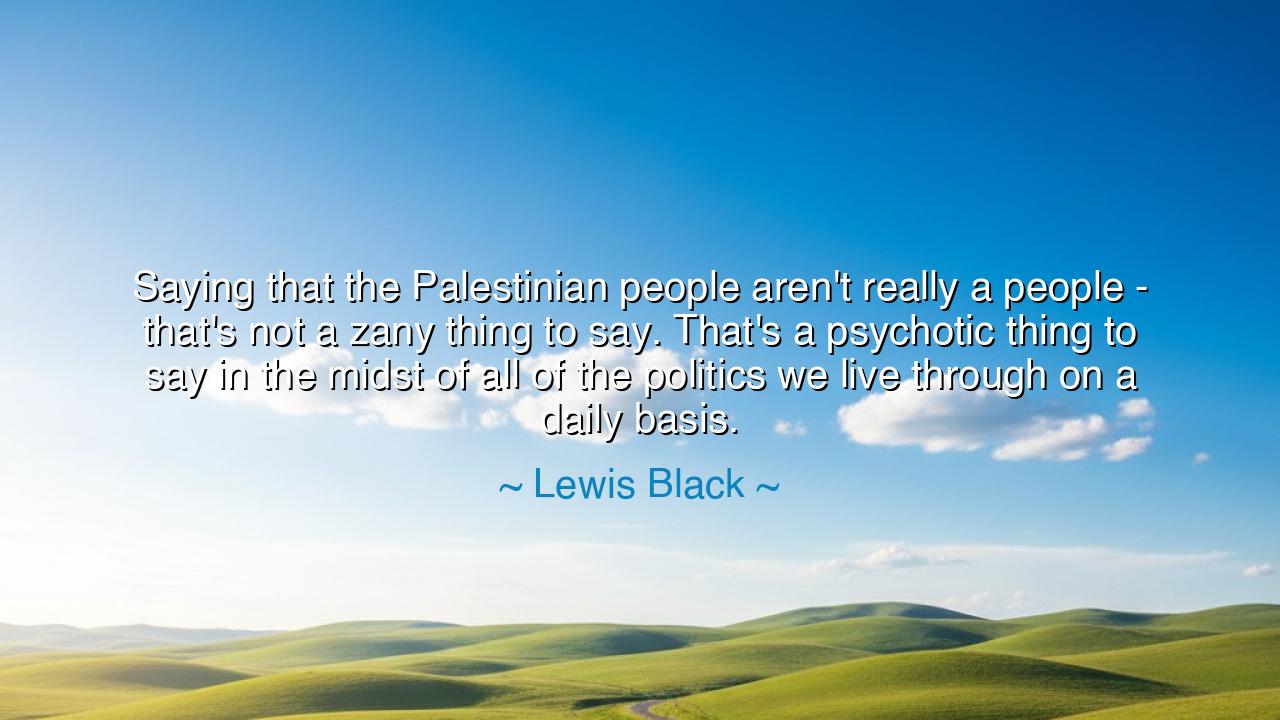
Saying that the Palestinian people aren't really a people -
Saying that the Palestinian people aren't really a people - that's not a zany thing to say. That's a psychotic thing to say in the midst of all of the politics we live through on a daily basis.






Hear, O seekers of justice, the fiery words of Lewis Black: “Saying that the Palestinian people aren't really a people - that's not a zany thing to say. That's a psychotic thing to say in the midst of all of the politics we live through on a daily basis.” These words come not as laughter alone, though Black is a comedian, but as a rebuke wrapped in satire. For in them he defends the dignity of a people long denied, and he unmasks the madness of denying the existence of any human community.
For to call a nation “not a people” is to strike at the root of its very being. It is to erase its history, its language, its faith, and its blood. Black reminds us that such words are not mere exaggerations of politics, not the zaniness of jesters in power, but the dangerous psychosis of dehumanization. For once a people are declared “not real,” violence against them becomes easier, injustice against them more tolerable, and their suffering more easily ignored.
History is full of such denials. Recall the fate of the Armenians in the Ottoman Empire, whose very existence was denied as their people were driven into exile and death. Recall also the cry of the Native Americans, declared “savages” rather than nations, their treaties broken, their lands stolen, their people nearly erased. Each time, the same lie was told: “These are not a people.” And each time, that lie became the cloak for atrocity.
So too does Black’s cry strike at the heart of our present world. The Palestinians, with their history, culture, and yearning for a homeland, are undeniably a people. To deny them is to deny the truth of human identity itself—that a people are formed by their shared memory and struggle. To erase them with words is to prepare the ground for erasing them with deeds. Thus Black calls such speech psychotic, for it divorces politics from reality and humanity.
Therefore, O children of the future, learn from this teaching: to mock or belittle a people’s existence is no jest, but a poison to the soul of nations. True politics is the recognition of every people’s humanity, and the search for justice among them. Let this wisdom be carried forward: no community, no nation, no people can be declared unreal, for to do so is to deny the very image of humanity.






TTNguyen Thi tham
Black’s comment about the Palestinian people being denied their identity speaks to a larger problem in global politics, where entire groups are erased or misrepresented. However, is this issue unique to the Palestinian situation, or is it part of a broader trend where groups of people in conflict zones are often reduced to nothing more than political pawns? How can we, as a global community, push back against the erasure of people’s identities for political gain?
NHNguyenn Hao
The quote seems to go beyond mere political disagreement and highlights an attempt to undermine the very existence of the Palestinian people. But how do we navigate these highly polarized discussions without resorting to dehumanizing language on either side? How does this statement reflect the broader challenges of discussing the Israel-Palestine conflict in a way that respects both sides’ humanity and history, without falling into harmful rhetoric?
MDDo thi my duyen
Black’s comment challenges a deeply disturbing mindset that seeks to erase Palestinian identity. The remark, ‘not really a people,’ shows the immense harm of denying cultural and historical narratives. However, how can we ensure that such language does not become normalized in political discourse? Does it become easier for society to dismiss marginalized groups when their very humanity is questioned or minimized?
Dduyen
This quote by Lewis Black is stark and jarring, but it cuts to the core of how some people in power attempt to delegitimize entire groups by denying their existence or identity. What does it mean for a people to be denied their status as a people? Does this form of denial create a dangerous precedent for how other oppressed groups might be treated in the future? How can the international community better confront these types of rhetoric?
LLLun Long
Black’s statement about the Palestinian people touches on a deep and often controversial issue in international politics. The claim that Palestinians aren’t really a ‘people’ is not just an offensive remark, but also one that attempts to erase their history and identity. How can such an assertion be made without ignoring the decades of struggle for recognition and statehood that the Palestinian people have endured? Is this quote a critique of political rhetoric or an expression of frustration with how political narratives are shaped?